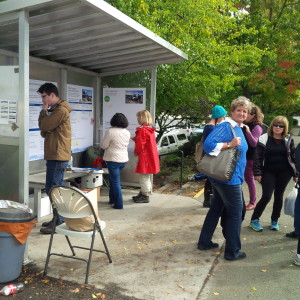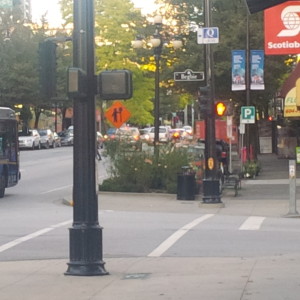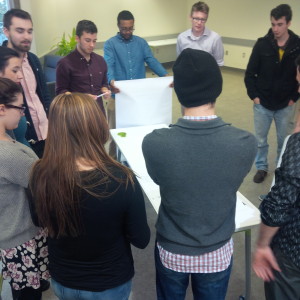 Okay, so you read the description of what the job of a transit planner entails, and you’re keen to become one. Now what?
Okay, so you read the description of what the job of a transit planner entails, and you’re keen to become one. Now what?
I can’t speak for every transportation manager out there, but in general when new employees come to the planning team I work with, they come from one of two streams:
- Land Use Planners: Usually these folks will have a Masters of Planning degree (with or without a transportation focus) and will have experience working at or for municipalities.
- Technical Transit Background: These folks have at least an Undergraduate degree (usually in Geography or other discipline with a focus on communities) and will have experience working with transit systems or a transportation consulting firm, often in a capacity related to transit system operations or infrastructure.
Is one better than the other?
In my own team, I like to have to have a mix of both because each brings different strengths. Also, the reality is that in either case we need to provide training: the land use planners need to learn more about the technical aspects of transit planning, scheduling and operations, the technical transit folks need to learn more about local government processes and land use planning.
And before you ask, I came at this via door #2.
So if you have a degree of some kind related to the field of geography, planning or communities, what then?
Here are some key qualities and ways to build experience:
 Passion for Cities: A job in transit planning is on the front lines of re-engineering cities: you need to be able to show that you live and breathe urban evolution and you get stuff done.
Passion for Cities: A job in transit planning is on the front lines of re-engineering cities: you need to be able to show that you live and breathe urban evolution and you get stuff done.
- How: Show how your interest in sustainable transportation aligns with how you live your life.
- Demonstrate how you have already contributed to your community through the projects you’ve completed and the organizations you’ve helped.
- How: Show how your interest in sustainable transportation aligns with how you live your life.
- Local Government Knowledge: You need to have an awareness of how local governments work: their governance, frameworks, and major plan components.
- How: If you’ve never actually worked at or for a municipality, volunteer as part of a municipal citizen committee or become active in a neighbourhood association.
- Be a part of Official Community Plan or other planning efforts as a citizen and ask organizers if there are other ways to be involved.
- Attend a council meeting as an observer and/or speak at a public hearing about something that matters to you.
- How: If you’ve never actually worked at or for a municipality, volunteer as part of a municipal citizen committee or become active in a neighbourhood association.
 Transportation Experience: What do you know about how transportation networks work and the typical questions people have when it comes to getting around?
Transportation Experience: What do you know about how transportation networks work and the typical questions people have when it comes to getting around?
- How, as a Volunteer: Again, volunteering as part of local government committee or neighbourhood associations can also present opportunities to build transportation experience, or volunteer with other mobility organizations (walking, cycling, car share, etc.).
- Step up to be the bike to work week or commuter challenge coordinator in your workplace.
- Work with parents and administrators of a school in your area to see if they have transportation-related questions that you can help answer (mapping out safe cycling routes, conducting a count to see how many students are arriving by various travel modes, collecting data to support speed zone or crosswalk changes being considered, etc.)
- How, on the Job 1: If you have a degree and are serious about wanting to work in transit, another potential path is to take a non-planning job in your local transit organization. This might include becoming a transit operator, or customer information agent or other role.
Of the ten people currently on my team, two started as transit operators driving buses and two started out as traffic checkers surveying passengers on buses.
- The best benefit to this is that you will truly understand the fundamentals of how a transit system works and see it through the eyes of its customers and front line staff.
- One caveat to this path is also ensuring that those in human resources and planning know what your long term career goals are.
- How, on the Job 2: And then working for other transportation consulting firms can also be an option. If you’re taking Geography, a co-op work/study program is a very wise investment in your future, whatever your ultimate goal might be.
- How, as a Volunteer: Again, volunteering as part of local government committee or neighbourhood associations can also present opportunities to build transportation experience, or volunteer with other mobility organizations (walking, cycling, car share, etc.).
 Analysis, Writing and Public Engagement: These skills are integral to the job.
Analysis, Writing and Public Engagement: These skills are integral to the job.
- How: Through your education, work and volunteer activities, look for ways to build your skills, experience and resume in these areas.
- If working with a community organization, look for a project that might involve surveying and conducting outreach, tabulating results and then creating a report or plan (and even better, lead to implementation of a result).
- How: Through your education, work and volunteer activities, look for ways to build your skills, experience and resume in these areas.
 Flexibility, Adaptability and Multiple Project Management: Like I mentioned in Part 1, a key part of this job involves listening well, creating the best possible solution given what you’ve got and adapting to challenges and opportunities as they arise. An ability to manage multiple projects is also key.
Flexibility, Adaptability and Multiple Project Management: Like I mentioned in Part 1, a key part of this job involves listening well, creating the best possible solution given what you’ve got and adapting to challenges and opportunities as they arise. An ability to manage multiple projects is also key.
- How: Make a habit of building your abilities as a facilitator among the teams, workplaces and projects you work with.
- Collect the stories where you’ve managed to help people navigate tricky situations or helped connect disparate ideas together.
- How, Short Order Cook Style: Don’t be afraid to talk about places where you’ve had to show hustle. When we are hiring for the entry-level position in our planning team, I’m always interested to hear if people have worked in the food service industry or any other place where you have to deliver good customer service in a very fast-moving environment. Really.
- How: Make a habit of building your abilities as a facilitator among the teams, workplaces and projects you work with.
Hope this at least provides some direction on how you can build your background to get you on the path. You can also find out general information on being a planner at the Planning Institute of British Columbia.
Got questions or other ideas? I’d love to hear from you in the comments below.
